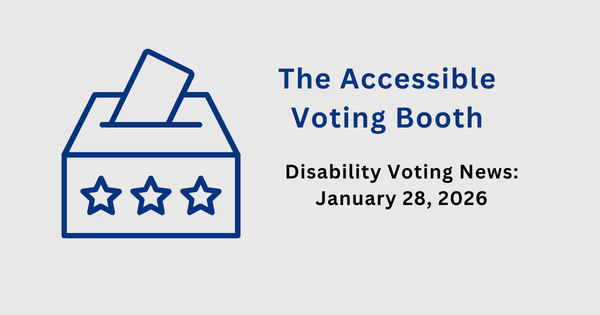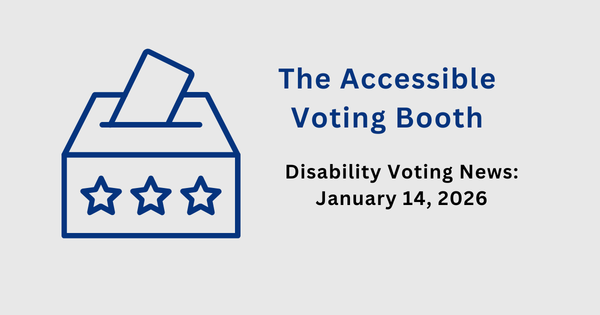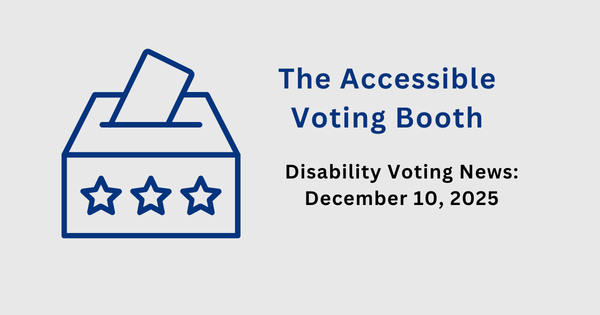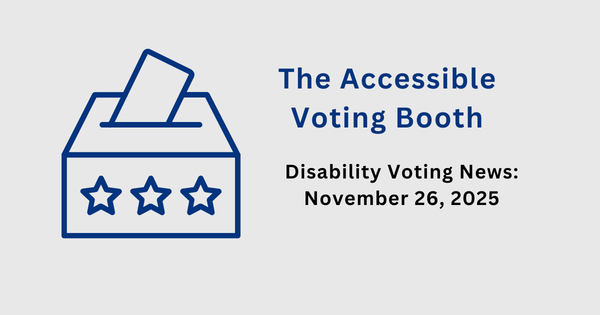Disability Voting News: July 9, 2025
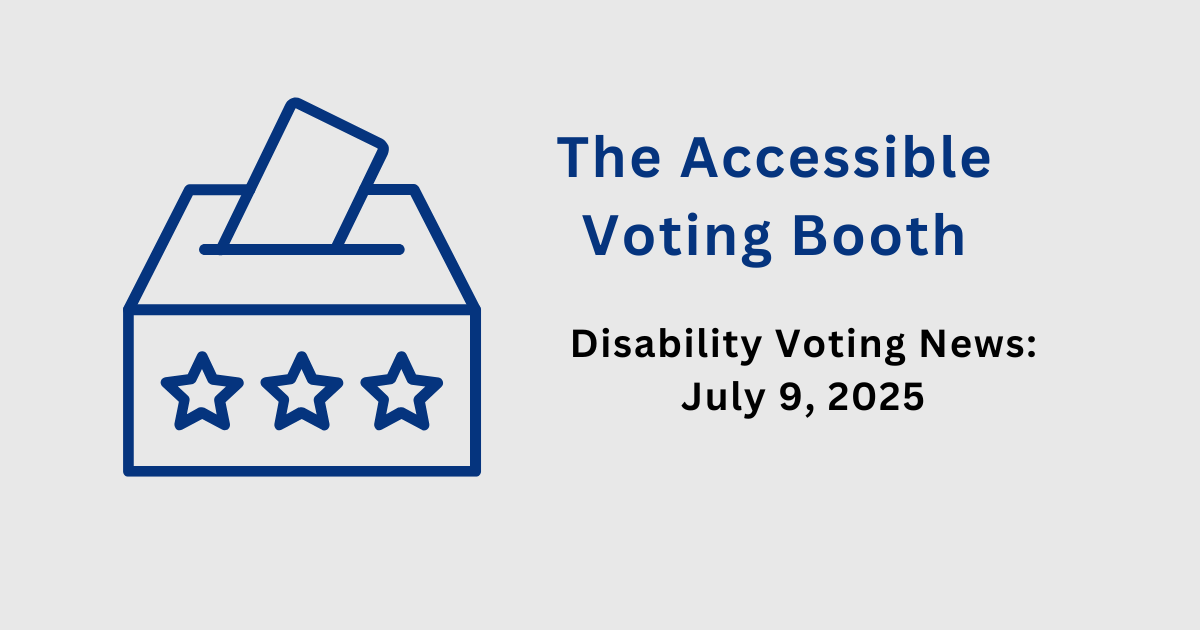
Welcome to the Accessible Voting Booth for July 9, 2025! Today, I’m starting off by sharing some upcoming events from the U.S. Election Assistance Commission about voting accessibility, then we’ll discuss updates out of Rhode Island and Virginia.
Also, next week I will be taking a short break from The Accessible Voting Booth. July is a super hectic month for me, and the next two weeks are very busy with hosting two training workshops for Disability Victory (which I shared in last week’s newsletter–be sure to register to attend these free events). I’ll be back on Wednesday, July 23rd with more voting news!
Your Voice, Your Vote–Accessible Polling Places and Election Supporting Technology
On Thursday, August 7 from 2:30 PM to 4:00 Eastern, join the U.S. Access Board and the U.S. Elections Assistance Commission (EAC) for a webinar on voting accessibility. The Help America Vote Act (HAVA) created the U.S. Elections Assistance Commission and the right for voters with disabilities to mark, cast and verify their ballots privately and independently. This webinar will cover data related to polling place accessibility during the 2024 election, including election-supporting technologies. Presenters will discuss standards related to polling place accessibility such as the Voluntary Voting Systems Guidelines (VVSG) and draft standards developed by the EAC’s Election Supporting Technology Evaluation Program. Additionally, presenters will demonstrate EAC accessibility web tools, research, and checklists designed to ensure polling place accessibility.
Real-time captioning provided along with video sign language interpreters. Participants can ask questions in advance during the registration process as well as ask questions during the live session.
Register for Your Voice, Your Vote.
Closing the Accessibility Gap: Voting in 2024 and Beyond
On August 28, join the U.S. Election Assistance Commission (EAC) for "Closing the Accessibility Gap: Voting in 2024 and Beyond" in the agency’s hearing room. This event will be held in person and live streamed on EAC’s YouTube Channel. Please only register if planning to attend in person.
The EAC will host panels featuring election administrators, EAC staff, and election subject matter experts. They will discuss progress made on serving voters with disabilities and new advances in technology, best practices, and funding opportunities to support accessibility efforts.
Register or watch the livestream here.
Rhode Island Governor signs bill into law to expand access to permanent vote by mail (via Voting Rights Lab).
First for an update on legislation covered in a previous issue of this newsletter: on May 14, I discussed HB 5709, which had just been passed by the Rhode Island House. This legislation aimed to expand permanent mail ballot voting to all voters. Previously, it was only available to those confined due to infirmity, illness, or disability. All other voters had to apply before each election for an absentee ballot (or apply for multiple elections at once if applying online).
On June 24, Governor Dan McKee signed this legislation into law, expanding permanent mail voting to all voters. This eliminates an administrative hurdle to absentee voting for all voters by offering a way for them to automatically receive an application ahead of each election. Because elections happen infrequently, it can be difficult to remember to apply before each election for an absentee ballot. Additionally, many disabled voters may not have felt like they qualified to be added to the permanent mail voting list that was restricted mainly to those who were confined due to disability or illness. Congratulations to Rhode Island for signing this legislation into law.
U.S. Supreme Court lets challenge to Virginia lifetime ban on felon voting proceed (via Reuters).
Virginia is one of three states that permanently disenfranchise people with felony convictions (except in cases of individual action from the governor, for which a returning citizen must individually petition the governor). Plaintiffs Melvin Wingate, Tati Abu King, and Toni Heath Johnson represented by WilmerHale, alongside the ACLU of Virginia, Protect Democracy, and Bridging the Gap in Virginia filed a federal lawsuit in 2023 challenging this disenfranchisement. The argument in this case is very interesting: it calls upon a law that set forth the terms of Virginia’s readmission to representation in Congress after the Civil War. From the ACLU:
“Following the Civil War, former Confederate states intent on keeping newly freed Black voters away from the ballot box targeted them with a growing number of criminal convictions, and then stripped people with criminal convictions of their right to vote.
To prevent such targeted disenfranchisement, the Virginia Readmission Act explicitly prohibits Virginia’s Constitution from being “amended or changed to deprive any citizen or class of citizens of the right to vote, except as a punishment for such crimes as are now felonies at common law.” In 1870 these crimes were: murder, manslaughter, arson, burglary, robbery, rape, sodomy, mayhem, and larceny.
But just a few years later, Virginia amended its Constitution, in violation of the Virginia Readmission Act, to disenfranchise people convicted of a far broader set of crimes.
Today, the Virginia Constitution disenfranchises all people convicted of any felony – including those that were not “felonies at common law” in 1870. As examples, drug offenses or publishing a document someone else forged — both felonies for which plaintiffs named in this suit lost their right to vote — were not felonies at common law in 1870. The lawsuit argues that Virginia cannot disenfranchise people convicted of those or other categories of crime without violating the Virginia Readmission Act.
This lawsuit seeks to redress this wrong and restore the voting rights Congress guaranteed to Virginia’s citizens in 1870.”
Virginia’s Attorney General Jason Miyares has sought to dismiss the lawsuit, but the challenge was allowed to go forward by a lower court. On June 23rd, the U.S. Supreme Court declined to hear the appeal, allowing this challenge to Virginia’s disenfranchisement to continue.
Voting rights restoration is a significant disability rights issue, as people with disabilities are overrepresented in the criminal justice system. 40% of people in state prisons have a disability while only 15% of the general population is disabled. 25% of incarcerated people have cognitive disabilities. Incarceration also causes disablement and exacerbates existing disabilities, as incarcerated people are kept in stressful and unhealthy environments, subjected to violence and trauma, and often denied accommodations.
I look forward to seeing what happens with this lawsuit and will keep you updated on any news!
Thank you for reading this week’s edition of The Accessible Voting Booth! As always, if you’d like to support the newsletter and my work, here’s how:
- Subscribe to the Accessible Voting Booth newsletter.
- Share this newsletter with your network to spread the word about disability voting rights.
- Leave me a tip. Thank you for supporting my work!

